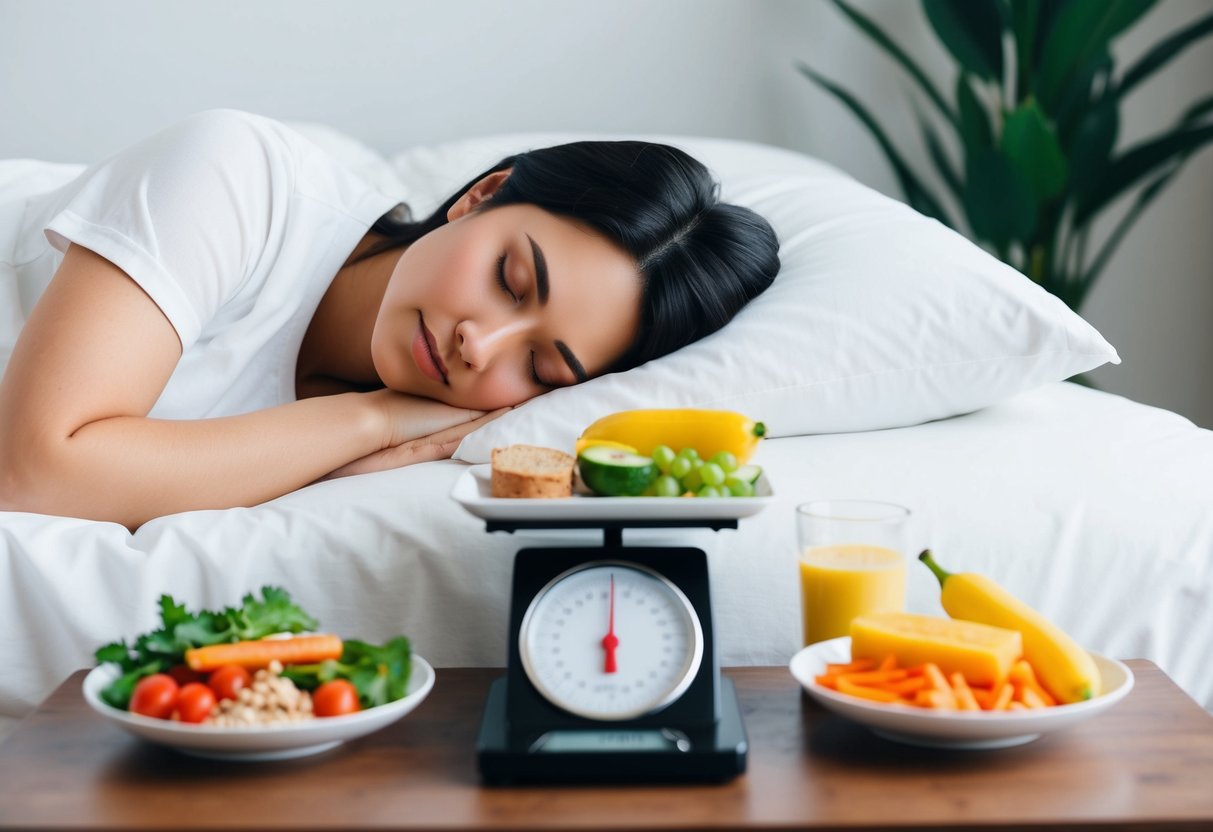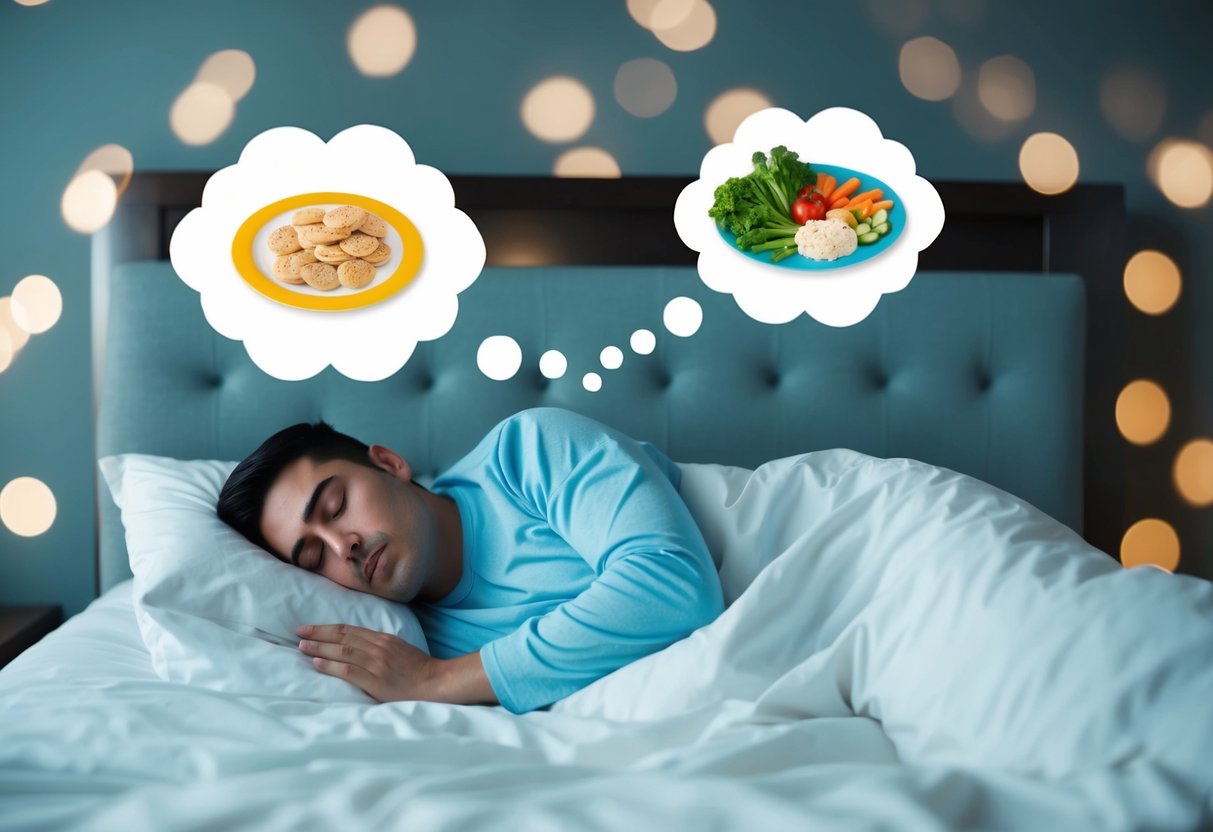Keto and Sleeping: Understanding Low-Carb Diet Effects on Sleep
This post may contain affiliate links. If you purchase through these links, I may earn a small commission at no extra cost to you. LEARN MORE.
Embarking on a ketogenic journey brings about many lifestyle changes, including some that affect how we sleep.
The significant reduction in carbohydrate intake on a keto diet can lead to noticeable changes in sleep patterns.
While some people experience improved sleep quality due to high fat consumption, others face challenges like insomnia when first starting the diet.

This shift in diet impacts the body’s sleep stages, potentially altering rapid-eye movement (REM) sleep.
Such changes might be temporary or occur as the body adjusts to fewer carbs and more fats.
Sleep disruptions may arise initially, but adaptation can lead to restful sleep over time.
To achieve the best outcomes while on a keto diet, individuals need to be aware of these potential sleep changes and explore strategies to support healthy sleep patterns.
Making informed dietary choices and addressing any sleep disruptions can help maintain a balance between weight loss goals and quality sleep.
New to keto? Read our guide on How to Start Keto for Beginners.
Struggling with keto diet? Try our Custom Keto Diet to help you to personalize your meal!
Key Takeaways
- Low-carb diets can initially disrupt sleep patterns.
- Adjusting dietary habits helps balance keto with good sleep.
- Adapting to keto may lead to improved sleep quality over time.
The Science of Keto and Sleeping

The keto diet changes how the body uses energy, which can impact sleep. It involves reducing carbohydrates and increasing fat intake, affecting sleep patterns, hormones, and even the brain’s chemistry.
Understanding Ketosis and Sleep Quality
Ketosis occurs when the body burns fat for fuel instead of carbohydrates. This change can impact sleep quality.
Ketosis is said to promote the production of adenosine, a chemical that helps regulate sleep.
When adenosine levels rise, it can lead to deeper sleep.
This sleep cycle enhancement may make individuals feel more rested.
However, while some people experience improved sleep in ketosis, others may face issues like fatigue or insomnia.
These sleep disturbances can be linked to dietary shifts and how the body adapts.
Learn more about science in ketosis in our guide on The Science of Ketosis: Exploring Metabolic Adaptation.
Effects of a Low-Carb Diet on Sleep Patterns
A low-carb diet, such as keto, can alter sleep patterns by affecting hormone levels and the circadian rhythm.
The reduction in carbs leads to fewer insulin spikes, which might stabilize energy levels but could also lead to initial difficulties in falling asleep.
Additionally, changes in nutrient intake could impact serotonin levels, influencing mood and sleep.
Some individuals may encounter sleep interruptions, while others find improvements in specific sleep stages.
It’s important to monitor changes and adjust dietary habits as needed to achieve optimal sleep quality.
Looking for ways to improve sleep on keto? Try these Top Magnesium Supplements for Sleep.
Nutritional Aspects of Keto Affecting Sleep

A ketogenic diet, characterized by high fat and low carbohydrate intake, impacts sleep through changes in specific nutrients. These changes influence how the brain regulates sleep patterns and overall rest quality.
Key Nutrients and Their Impact on Sleep
In a keto diet, the intake of healthy fats is increased significantly.
Foods like avocados, almonds, and salmon provide essential fatty acids that are crucial for brain function. These fats can sometimes lead to shorter periods of sleep latency.
Protein-rich foods, such as fish and meat, are staples in a keto diet. They contribute positively by reducing oxidative stress and improving sleep quality.
While protein helps with body repair during sleep, balancing it with sufficient carbs is a challenge on keto.
Maximize your micronutrient intake with our Ultimate Keto Diet Food List for Healthy Weight Loss.
The Role of Tryptophan and Melatonin
Trytophan is an amino acid present in high-protein foods like salmon and meat.
It’s a precursor to serotonin and subsequently melatonin, a hormone crucial for sleep regulation.
The keto diet might affect tryptophan availability due to low carbohydrate intake.
With fewer carbs, insulin spikes less, potentially reducing tryptophan transport to the brain, affecting melatonin production.
Adjusting food sources to ensure adequate tryptophan can help maintain melatonin levels, promoting better sleep patterns.
Proper planning in the keto diet helps optimize these hormonal pathways for restful nights.
Sleep Stages and the Keto Diet

The keto diet, which lowers carbohydrate intake, can have both positive and negative impacts on sleep stages.
Specific changes may occur in REM and deep sleep as the body adapts to a new energy source. These changes are linked to shifts in hormonal balance during the night.
Keto’s Effects on REM and Deep Sleep
Switching to a keto diet can alter how the body enters and moves through sleep stages.
Many people on keto experience increased slow-wave sleep or deep sleep, which is crucial for bodily recovery and hormone regulation.
This change may stem from the energy shift as the body relies more on fats than on carbohydrates.
REM sleep, a key phase for mental restoration, can be initially disrupted for some during the keto transition.
Adjusting to fewer carbs may cause a temporary decline in REM sleep, but it often stabilizes after the body fully adapts.
Hormonal balance is also affected, which influences sleep patterns.
Increased production of certain hormones, like ketones, can enhance deep sleep but may lead to initial disturbances in regular sleep cycles.
This makes the first weeks of keto an adjustment period for sleep stages.
Weight Loss, Sleeping Disorders, and Keto

Keto diets can play a role in managing obesity-related sleep issues and may influence conditions like sleep apnea. Changes in diet often impact sleep patterns, making it important to understand these relationships.
Keto Diet and Its Impact on Obesity-Related Sleep Issues
The keto diet, known for its ability to help people lose weight, has been shown to affect sleep quality. This impact is particularly relevant for individuals struggling with obesity-related sleep disorders.
As people reduce their carbohydrate intake and increase fats, they often experience improved metabolic health. These changes can help decrease waist circumference and reduce symptoms associated with poor sleep.
Studies suggest that a low-carb diet can help with weight loss, which in turn may alleviate conditions like insomnia that are linked to obesity.
Weight reduction can lessen the burden on the body, leading to more restful sleep.
It’s important to monitor sleep patterns when starting the keto diet, as adjustments in macronutrient intake can initially disrupt sleep but may stabilize over time.
Struggling with weight loss? Learn Why Am I Not Losing Weight on Keto? Tips to Overcome Common Mistakes.
Sleep Apnea and Low-Carb Diets
Sleep apnea, especially obstructive sleep apnea (OSA), is a common issue among overweight individuals.
A low-carb diet like keto might help address the root causes of OSA by promoting weight loss.
As excess weight is shed, especially around the neck and upper body, the risk of airway obstruction during sleep decreases.
Patients with OSA often find that reducing obesity-related factors contributes to better sleep quality.
The relationship between keto and OSA isn’t just about weight loss but also involves metabolic changes that can positively affect sleep patterns.
While more research is needed, maintaining a healthy weight can be a beneficial strategy for managing sleep apnea symptoms.
Need a personalized keto meal plan for better health and sleep? Try the Custom Keto Diet Plan.
Common Challenges and Solutions

Shifting to a keto diet can bring noticeable changes to sleep patterns. It may lead to initial insomnia, electrolyte imbalances, and other symptoms linked to keto flu. Addressing these challenges can help improve sleep quality.
Addressing Keto-Induced Sleep Disturbances
A sudden drop in carb intake can cause trouble sleeping.
Insulin and blood sugar levels play a role here. As insulin reduces, hypoglycemia may occur, leading to wakefulness.
Overcoming this requires balancing fat intake. Include more healthy fats to maintain energy levels.
Electrolyte imbalance is another factor.
Supplementing with magnesium, potassium, and sodium can help. These nutrients support nerve function and muscle relaxation, promoting better sleep.
Hydration is key, too, as dehydration may aggravate sleep problems.
Check out the best selling electrolytes from Amazon below.
Mitigating Keto Flu and Its Effect on Sleep
The keto flu presents various symptoms like headache, hunger, and irritability.
These can be unsettling, especially during sleep.
A gradual switch to low-carb can ease these symptoms rather than a sudden dietary change.
By slowly reducing carbs, the body adjusts more smoothly.
Supplements may aid the process.
Consuming electrolytes helps fight the flu’s impact.
Maintaining consistent meal timings can also aid insulin regulation, reducing sudden hunger pangs that disturb sleep.
Creating a calming pre-bed routine and ensuring a comfortable sleep environment further mitigates keto flu effects on sleep.
Dealing with keto flu? Read How to Avoid Keto Flu and Stay Energized.
Lifestyle Considerations for Optimal Sleep on Keto

Adapting to a keto diet can influence various lifestyle aspects that impact sleep quality. Key elements include exercise habits, appetite changes, and the intake of substances like caffeine and alcohol.
The Influence of Exercise and Appetite on Sleep
Regular physical activity can improve sleep quality, especially when following a keto diet.
Exercise helps regulate body weight and promotes restful sleep by boosting mood and reducing stress.
On a keto diet, appetite may decrease, which can reduce late-night snacking and improve sleep.
However, some may still experience sugar cravings, leading to sleep disruptions.
Choosing low-carb snacks such as nuts or a small serving of oatmeal can help manage these cravings.
Exercise, especially in the morning or afternoon, also supports cognitive performance and immune function, which in turn positively impacts sleep.
Learn how to optimize workouts with Keto and Exercise: Optimize Low-Carb Workouts Effectively.
Managing Caffeine and Alcohol Consumption
Caffeine, commonly found in coffee and tea, can interfere with sleep if consumed too late in the day.
On a keto diet, it’s important to monitor caffeine intake to avoid restlessness at night.
It’s advisable to limit caffeine to morning hours to ensure better sleep.
Alcohol can also disrupt sleep patterns.
While it might initially make one feel sleepy, it can lead to poorer sleep quality later in the night.
Limiting alcohol consumption and ensuring it is consumed several hours before bedtime can help promote more restful sleep.
Explore the best beverages in Top 10 Keto-Friendly Drinks: Stay Refreshed and in Ketosis.
Frequently Asked Questions

People following a keto diet often wonder about its impact on sleep. Questions arise about handling insomnia, the timing of sleep disturbances, and other challenges encountered during this low-carb diet.
What are some effective remedies for keto-related insomnia?
To help improve sleep, individuals can try adjusting their diet to include more magnesium-rich foods.
Staying hydrated is also vital.
Adequate intake of electrolytes may stabilize sleep patterns.
Ensuring a dark, quiet, and comfortable sleep environment can further assist in promoting restful nights.
At what point in the keto diet might one experience insomnia?
Insomnia is most likely to appear within the first few weeks of starting the keto diet.
During this time, the body is adjusting to a drastic change in macronutrients.
As the body switches from burning carbs to fats for energy, sleep patterns can be disrupted.
Can adhering to a keto diet enhance fat burning during sleep?
While on a keto diet, the reduction in carbohydrates encourages the body to burn stored fat for energy.
This process, known as ketosis, continues during sleep. This can potentially increase fat burning even when at rest, contributing to weight management.
Is the incidence of insomnia temporary for those on a keto diet?
For many, insomnia is a temporary issue.
As the body becomes accustomed to ketosis, sleep disruptions often diminish.
Over time, many individuals experience improved sleep quality and longer sleep duration as their body adapts.
What are the toughest challenges when adapting to the keto diet?
The transition phase can be difficult, with symptoms like fatigue, headaches, and sleep disturbances.
Known as the “keto flu,” these symptoms are part of adapting to fewer carbs.
Staying hydrated and maintaining electrolyte balance are critical in easing these challenges.
How does magnesium supplementation affect sleep quality on a keto diet?
Magnesium is important for sleep regulation.
Supplementation can help improve sleep quality for those on a keto diet, especially if their diet lacks magnesium-rich foods.
This mineral may help in reducing insomnia and promoting restful nights by supporting muscle relaxation and calming the nervous system.
Conclusion
Keto and low-carb diets can influence sleep patterns in several ways. Some studies suggest that reducing carbohydrates might affect REM sleep, a crucial stage for dreaming.
The quality of sleep can also be modulated by steady blood sugar levels.
A ketogenic diet can help stabilize these levels, potentially leading to improved sleep for individuals facing sleep disruptions.
On the other hand, the initial phase of the ketogenic diet, often referred to as “keto flu,” might make it harder for some people to sleep comfortably.
As with any dietary change, individual reactions can vary. Monitoring one’s diet and sleep relationship can offer insights into personal health.
Ready to transform your health and improve sleep quality– start your Custom Keto Diet journey today for a personalized, effective approach!






